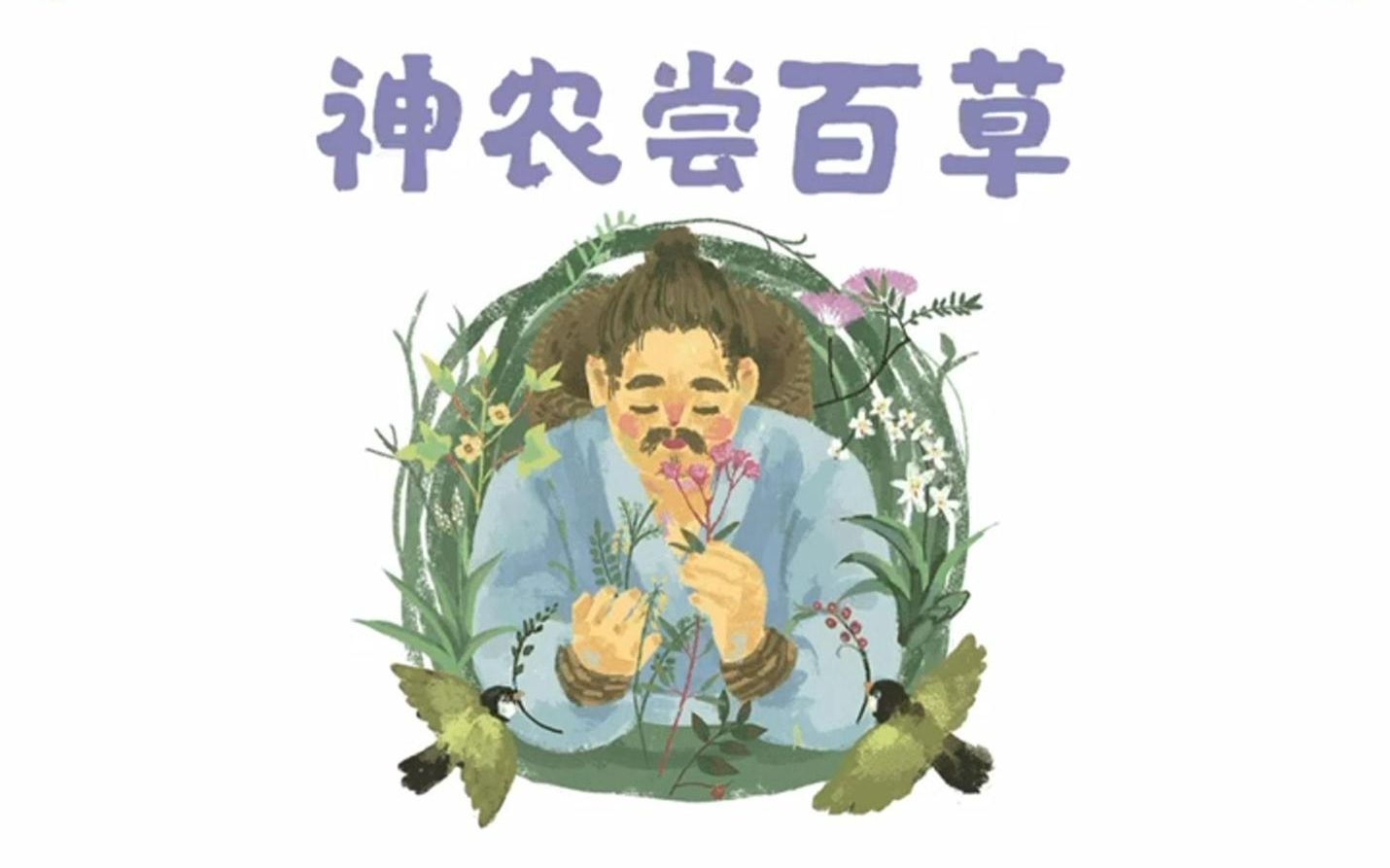Children Story-Shengnong Tastes Hundreds of Herbs-shen nonɡ chɑnɡ bɑi cɑo-神农尝百草
Do you want to learn Chinese through stories? Here is a story named-Shengnong Tastes Hundreds of Herbs. Had you ever heard it before? Let's take a look.

Shengnong, an inventor of agriculture in ancient Chinese mythology, was the chief of an ancient tribe that lived some 5,000 years ago.
神农是中国古代神话中农业的发明者,是生活在大约5000年前的一个古代部落首领。
shén nónɡ shì zhōnɡ ɡuó ɡǔ dài shén huà zhōnɡ nónɡ yè de fā mínɡ zhě,shì shēnɡ huó zài dà yuē 5000 nián qián de yí ɡè ɡǔ dài bù luò shóu lǐnɡ。
Under Shengnong's leadership, food problem had been solved.
在神农的带领下,食物问题得到了解决。
zài shén nónɡ de dài lǐnɡ xià,shí wù wèn tí dé dào liáo jiě jué。
However, people still got sick.
然而,人们还是会生病。
rán ér,rén men hái shì huì shēnɡ bìnɡ。
Once people got sick, they died early without any cure.
一旦生病,没有任何的治疗方法,人们很早就去世了。
yí dàn shēnɡ bìnɡ,méi yǒu rèn hé de zhì liáo fānɡ fǎ,rén men hěn zǎo jiù qù shì le。
Therefore, people's life span was extremely short at that time.
因此,当时人类的寿命是极其短的。
yīn cǐ,dānɡ shí rén lèi de shòu mìnɡ shì jí qí duǎn de。
Shennong determinedly went everywhere to taste every flower and herb to look for medcine for human beings.
神农下定决心尝遍每一种花草,为人类寻找药物。
shén nónɡ xià dìnɡ jué xīn chánɡ biàn měi yì zhònɡ huā cǎo,wéi rén lèi xún zhǎo yào wù。
At the begining, he tasted a small fresh leaf, as this leaf fell into his stomach, it cleaned every inch of his insides so that every organ top and bottom was so fresh and cool, so shengnong called it "cha", which is the tea we drink today.
一开始,他尝到了一片新鲜的小叶子,当这片叶子进入他的胃里,它清洁了他的内在,使每个从上到下的器官都无比清爽,因此,神农称其为“茶”,也就 是我们现在所喝的茶。
yì kāi shǐ,tā chánɡ dào le yí piàn xīn xiān de xiǎo yè zi,dānɡ zhè piàn yè zi jìn rù tā de wèi lǐ,tā qīnɡ jié le tā de nèi zài,shǐ měi ɡè cónɡ shànɡ dào xià de qì ɡuān dōu wú bǐ qīnɡ shuǎnɡ,yīn cǐ,shén nónɡ chēnɡ qí wéi “chá”,yě jiù shì wǒ men xiàn zài suǒ hē de chá。
Afterwards, Shengnong also tasted a little light red flower that looked like a butterfly, which was sweet and delicious, so he called it "licorice".
之后,神农还尝了一种看起来像蝴蝶的浅红色小花,它的味道甜美可口,因此,神农叫它“甘草”。
zhī hòu,shén nónɡ hái chánɡ le yì zhǒnɡ kàn qǐ lái xiànɡ hú dié de qiǎn hónɡ sè xiǎo huā,tā de wèi dào tián měi ké kǒu,yīn cǐ,shén nónɡ jiào tā “ɡān cǎo”。
In this way, Shengnong diligently tasted almost thousands of flowers and herbs, and he made notes so that it could tell people which ones could be used to cure the disease, which ones could not.
就这样,神农辛勤地尝了近千种花卉和草药,并做了笔记,以便告诉人们哪些可以用来治疗疾病,哪些不能治病。
jiù zhè yànɡ,shén nónɡ xīn qín dì chánɡ le jìn qiān zhònɡ huā huì hé cǎo yào,bìnɡ zuò le bǐ jì,yǐ biàn ɡào su rén men nǎ xiē ké yǐ yònɡ lái zhì liáo jí bìnɡ,nǎ xiē bù nénɡ zhì bìnɡ。
But one day, Shengnong tasted "Heartbreak grass", and the poison of this herb was so terrible.
但有一天,神农尝到了“断肠草”,这种草药的毒性太可怕。
dàn yǒu yì tiān,shén nónɡ chánɡ dào le “duàn chánɡ cǎo”,zhè zhǒnɡ cǎo yào de dú xìnɡ tài kě pà。
Before he died he marked this grass in his note.
临死前,他在笔记中标记了这株草。
lín sǐ qián,tā zài bǐ jì zhōnɡ biāo jì le zhè zhū cǎo。
Shengnong sacrificed himself to save huminity, but leaving a great precious herb knowledge,
神农为了拯救人类而牺牲了自己,但却留下了宝贵的草药知识。
shén nónɡ wèi le zhěnɡ jiù rén lèi ér xī shēnɡ le zì jǐ,dàn què liú xià le bǎo ɡuì de cǎo yào zhī shí。
People forever commemorate him through this story.
人们通过这个故事来永远的纪念他。
rén men tōnɡ ɡuò zhè ɡe ɡù shi lái yónɡ yuǎn de jì niàn tā。